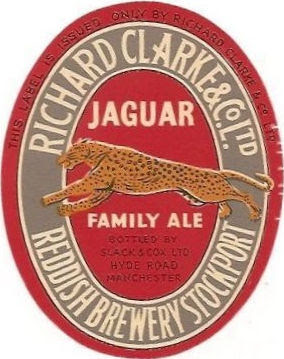A mis-cataloguing, I’m sure. There are other Clarke’s brewing records archived in Stockport, where the brewery was based. They were bought and closed by Boddington, presumably to get hold of their pubs. That’s just how things worked, if you wanted to expand your business.
According to the ever handy “Century of British Brewers plus plus” (by Norman Barber 2013, page 107) Richard Clarke & Co. Ltd. was founded in 1865 and bought by Boddington in 1963.
The log I found looks like the last. A bit sad that.
MB must mean Mild Beer. Dark, by the look of the recipe. Quite possibly darkened more with primings. A lot of that went on.
The grist has the bizarrely-fashionable and probably pointless enzymic malt, along with base malt, flaked maize and sugar. So pretty standard stuff. The log just says “invert”. No.3 is my guess.
Slightly unusually for a Mild, MB is dry hopped. Not a huge amount, but about the as much as a Bitter of the same strength. Talking of hops, they were Kent (1960 harvest), Sussex (1960), Worcester (1960) plus Worcester (1960) dry hops I’ve interpreted the Kent and Sussex hops as Fuggles, the Worcester hops as Goldings.
1/2 is the price, in case you're wondering. 1 shilling 2 pence for a pint in the public bar.
| 1961 Clarke 1/2 MB | ||
| pale malt | 5.75 lb | 79.31% |
| enzymic malt | 0.125 lb | 1.72% |
| flaked maize | 0.25 lb | 3.45% |
| caramel 1000 SRM | 0.125 lb | 1.72% |
| glucose | 0.25 lb | 3.45% |
| No. 3 invert sugar | 0.50 lb | 6.90% |
| malt extract | 0.25 lb | 3.45% |
| Fuggles 90 min | 0.50 oz | |
| Goldings 30 min | 0.50 oz | |
| Goldings dry hops | 0.125 oz | |
| OG | 1033 | |
| FG | 1012.5 | |
| ABV | 2.71 | |
| Apparent attenuation | 62.12% | |
| IBU | 13.4 | |
| SRM | 14 | |
| Mash at | 154º F | |
| Sparge at | 170º F | |
| Boil time | 90 minutes | |
| pitching temp | 62º F | |
| Yeast | Wyeast 1318 London ale III (Boddingtons) | |
This recipe appears in my book about UK beer after WW II. You can buy it here:
http://www.lulu.com/content/paperback-book/austerity/23181344












































































4 comments:
Hi Ron - delighted to see a Clarke's recipe here. The mild was apparently know in the pubs as Clarke's Blood Mixture. Although on reflection, it's just occurred to me that might be a 'BM' or Best Mild (I'm assuming they had one of those as most local brewers did).
Ron, I seem to remember other commenters stating that enzymic malt was what we would today call acidulated malt, used to control the mash pH. Is that right?
Anonymous,
that could be right. I've never quite got the point in its use. Maybe a professional brewer could chip in. (You could be a professional brewer for all I know.)
Enzymic malt or Acidulated malt is used to help lower the mash ph. As a homebrewer I use it in my brews, the water in my area is fairly hard and ideal for stouts and porters but for pale ales and ipa's etc. I use a proportion of acid malt to acheive my ph targets of between 5.2 to 5.6 otherwise I wouldhave to add some sort of acid to acheive a similar result.
Post a Comment